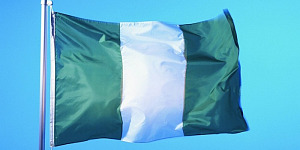Nigeria's central bank lowered its monetary policy rate for the first time in 3-1/2 years, noting "with great satisfaction" the continued decline in inflation, the stability of the naira's exchange rate, a robust level of reserves and positive forecasts for economic growth in 2019.
The Central Bank of Nigeria (CBN) cut its key rate by 50 basis points to 13.50 percent, the first change in rates since a 200 basis point rate hike in July 2016 and and the first rate cut since November 2015.
"The Committee also noted that having achieved a relatively stable exchange rate with price stability, it is imperative that monetary policy should explore the next steps necessary for enhancing growth, reducing unemployment and diversifying the base of the economy," the central bank said.
CBN's monetary policy committee (MPC) noted a rise in capital inflows into Nigeria, saying this was "a demonstration of sustained confidence by the foreign investor community in the Nigerian economy," but added it was not "unmindful" of the slowdown in economic growth of some advanced economies, with the dovish stance of some central banks acting "as an early warning sign of broader macroeconomic vulnerabilities."
The rate cut was decided by 6 of the 11 members of the MPC, with 2 members voting in favor of a 25 point, one member voting for a 100 point cut and 2 members voting to keep the rate unchanged.
In addition, 10 of the 11 members voted to keep all policy tools constant while one member voted to lower the cash reserve ratio (CRR) to 21.5 percent from 22.5 percent.
Nigeria, which relies on oil for about 80 percent of its exports, was hit hard by the fall in crude oil prices in 2014 which lead to a chronic shortage of foreign exchange and capital flight.
In contrast to other oil exporters, such as Russia and Kazakhstan that let their currencies decline, Nigeria propped up its naira via capital controls and spent some 20 percent of its foreign reserves defending the naira's peg to the U.S. dollar from early 2015 around 199.
But in June 2016 the CBN finally scrapped the peg in favor of a managed float, leading to an immediate 30 percent plunge in its value.
As the pressure on the naira continued, the central bank opted for a system of multiple exchange rates rather than floating its currency and the naira settled around 315 to the dollar in the first half of 2017. In August 2017 the naira fell another 14 percent when the CBN moved toward unifying its multiple exchange rates.
Since then the naira has been more stable and was trading at 362 to the dollar today, up 0.4 percent since the start of this year, a development the CBN "noted with satisfaction."
A moderate rise in oil prices has helped Nigeria's reserves, which rose 6.73 percent to US$45.2 billion as of March 21 from end-February.
The fall in the naira has kept up pressure on inflation but since mid-2018 it has stabilized though it has remained above 11 percent since May.
In February headline inflation eased to 11.31 percent and core inflation eased to 9.8 percent, mainly due to lower food prices.
Nigeria emerged from recession in 2017 and economic growth steadily picked up speed last year, with gross domestic product rising an annual 2.4 percent in the fourth quarter of 2018, up from 1.81 percent in the third quarter, and the highest growth rate since the third quarter of 2015.
The main impetus for growth came from the non-oil sector, which grew 2.7 percent in the fourth quarter while the oil sector shrank by 1.62 percent.
CBN's policy decision comes amid talk that its governor, Godwin Emefiele, will step down at the end of his 5-year term in June.








































